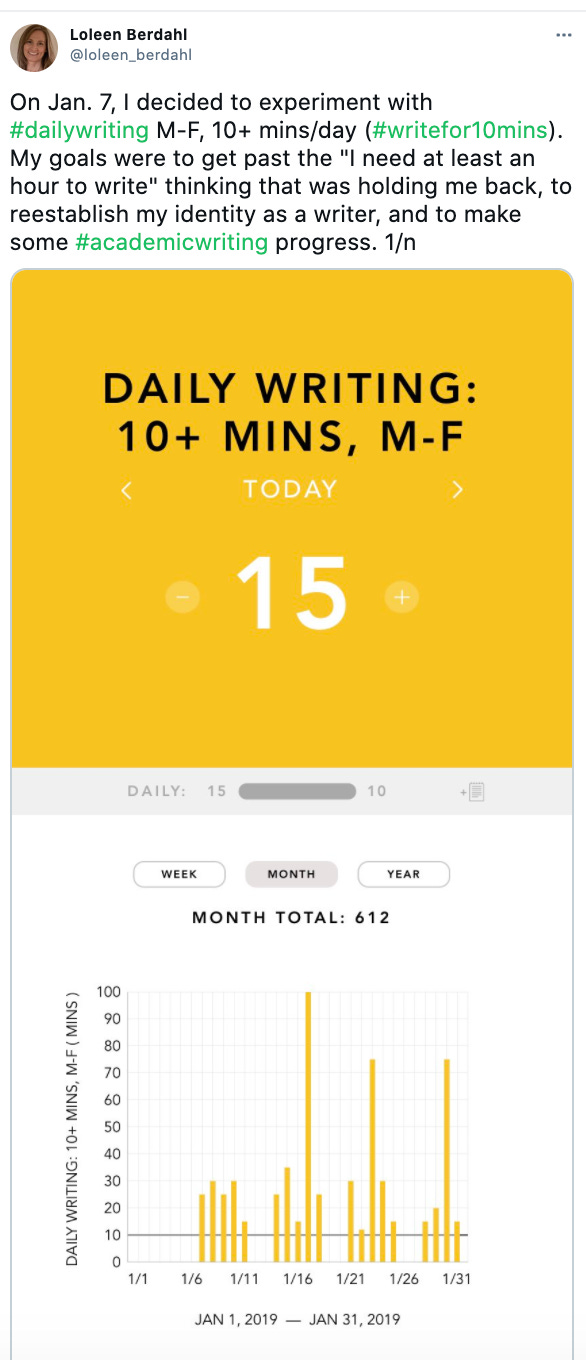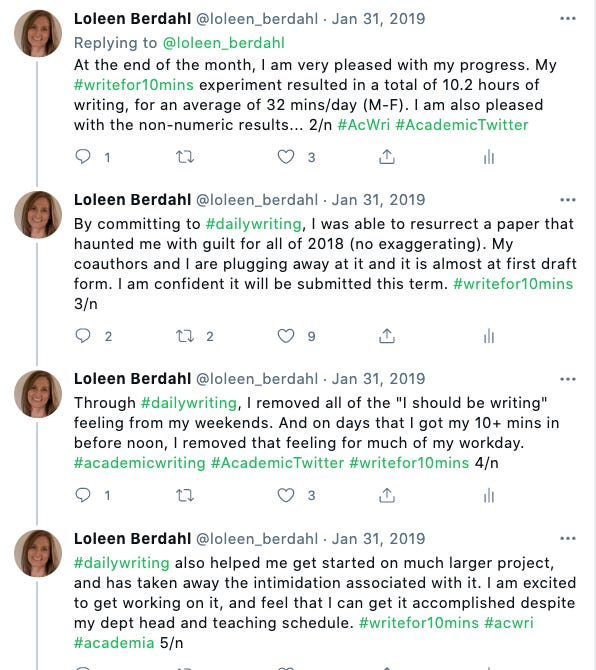How to write when you don’t want to write
Plus a photo of my cats, due to popular demand. (Actually, no one asked for this, but you deserve some cuteness in your day.)
Hello and welcome to Academia Made Easier. I am so glad that you are here.
In my last newsletter, I discussed my love of strategic procrastination - that is, deliberately putting off low leverage tasks that need to get done but don’t move the needle on your personal goals or success. My ability to delay low-value tasks is well-honed, and I have many strategic procrastination ideas I will share in future newsletters.
But before we discuss that, we need to tackle non-strategic procrastination. You know, the important project that matters greatly to your future success - and your current peace of mind - that you are not working on.
Stay with me here.
Chances are good that this project involves a fair amount of writing. In my experience, both personally and from years of leading workshops and mentorship teams with graduate students and academic colleagues, writing procrastination holds a tremendous amount of shame. “You should be writing”, the memes taunt us, with the same judgmental tone associated with matters related to diet, exercise, and house cleaning. (That last one might just be me.)
The writing procrastination shame cycle can be immobilizing for many people working in academia, be they students, staff whose work responsibilities involves considerable amounts of writing, early career researchers, mid-career faculty, or later career academics who are wondering how to get their mojo back. (Again, that last one might just be me.)
If you relate to any of this, I have a small idea to move you forward out of this far-too-familiar stuck point. But before we discuss this, please consider and answer for yourself the following two questions.
Question 1: Why does this particular project matter to you?
There are many reasons to write in academia, but only some are intrinsically motivating. When the reasons to write are primarily or exclusively external, the emotions attached can go negative quickly. I must write to: finish my dissertation, be competitive on the job market, get past renewal, achieve tenure, make sure my ideas aren’t scooped, earn promotion, write the book that will redefine scholarship in my field, stay respectable in my field, get the funding that my program needs, reestablish myself as a researcher after a decade in administration.
That list makes me want to breathe heavily into a paper bag and then eat large amounts of chocolate.
The external reasons for writing are often valid. The products of writing (articles, books, reports, funding requests) are important to our careers. But if they are the primary or only reason for writing, moving forward on writing depends on willpower.
As my history with chocolate shows, willpower gets worn down easily.
It is so easy to get detached from the reasons that we wanted to work in academia in the first place. Curiosity. A sense of wonder. A desire to find an answer to an intriguing or important question. And the pleasure of working through the problem to find that answer.
It is easy to forget that writing can be satisfying. Really satisfying.
So ask yourself, what is it about this writing project that intrigues you? Why, outside of your external goals, do you want to follow it through to the end? What do you find gratifying about it?
Please take a minute to get in touch with your answer to this (I will wait!) and then proceed to the next question.
Question 2: Are you really procrastinating or do you just have too much going on?
In true academic fashion, I think it is important to use our terms correctly. “Procrastination” has, by definition, an element of intentionality and choice, of “blameworthy delay especially through laziness or apathy”.
If you are not writing because you have a leadership position and your schedule is full of meetings and operational duties, you are not procrastinating, you are prioritizing another aspect of your job. If you are not writing because you are teaching a class (or two) while supervising your children’s learning due to pandemic school closures, you are not procrastinating, you are surviving. If you are not writing because you are exhausted after 14 months of remote teaching, research, and service, you are not procrastinating, you are in desperate need of some time off.
It is possible that you have the time and energy to write and are intentionally choosing not to do so. If this is the case, feel free to call it procrastination. But if your challenge is related to available time and/or energy, be clear (and kind) with yourself about that.
Today’s small idea works for people who know why (beyond the external motivations) they want to write and are struggling with limited time and/or with the challenge of getting (re)started. It asks very little of you, and while it may seem underwhelming, in my experience it is nothing short of magic.
One Small Thing to Try Immediately: Write For 10 Minutes
In early January 2019, I was frustrated with myself. I had writing goals that mattered to me, both external (I didn’t want to let my coauthors down; research is a job responsibility) and internal (I identify as a writer and researcher; I am truly interested in my research areas). But my department head duties, university service commitments, and teaching and graduate supervision responsibilities left little time or energy for writing.
In short, I had the motivation to write but lacked a workable strategy in light of my current realities. I needed a way forward.
Two friends and I decided to try an experiment. Using the logic that ten is greater than zero (math is fun!), we set a group challenge to write for 10 minutes a day. Write for 10 Minutes, as we came to call it, has simple guidelines:
Write for 10 minutes. After that, stop or keep going. Treat writing for 10 minutes as an equal victory as writing for 100 minutes.
Define writing in whatever way makes sense for your current project stage. This may be crafting new text, formatting footnotes, outlining, opening the file and making a list of bullets, or whatever you feel moves your work forward that day.
Aim for five days, with weekends off, but if you miss a day, just restart the next. Four days, or even one day, is greater than zero days.
Celebrate all victories, small and smaller. Forward is forward.
To amuse ourselves, we reported our challenge progress on Twitter (#WriteFor10Mins), invited others to join in, and celebrated our successes with fun GIFs.
It proved to be a very effective way to gently restart writing. As an approach steeped in kindness rather than self-criticism, it made writing less intimidating. All three of us moved our writing forward, much more so than we would have if we had waited for large blocks of time or for “inspiration” to write.
And the time - sometimes 10 minutes, sometimes 40, sometimes 90 - added up.
If you struggle to start writing and want a compassionate way to move forward, or if you want to write and struggle to find time to do so, I encourage you to experiment with Write for 10 Minutes for one week.
You may find that it works perfectly for your schedule and that you want to stick with it for another week, or longer. If so, congratulations on finding a new writing schedule. You may find it kickstarts you past a stuck point and allows you to move to a different writing system, such as scheduled time-blocking. If so, congratulations on moving forward. And you may find that it does not meet your needs at all. If so, congratulations on experimenting with something new and having an open mind.
I regularly use Write for 10 Minutes to restart writing projects, and to allow myself to keep active as a writer when time is short. At other times, I use other approaches that I will discuss in the future. Write for 10 Minutes taught me to be flexible in my thinking about what ‘counts’ as writing, and to adapt to keep moving my writing forward as circumstances change. Forward is forward.
I strongly encourage you to experiment with different approaches to writing and to use what works to help you stay connected with that intrinsically rewarding part of writing that matters most to you. If you try Write for 10 Minutes, please let me know what you think. I would love to hear from you!
Chipping Away: What I Have Been Up To
A quick update on some of my own recent and upcoming activities since my last newsletter, since I have your attention:
Speaking of writing, in an unexpected confluence of releases, a few things I wrote were all published this past week! In my May University Affairs column, The Skills Agenda, I provide faculty and instructors with an easy approach to quickly create the learning outcomes for fall courses. If you are teaching this fall, be sure to check it out. Related to my research on Canadian politics, I also wrote an opinion editorial for The Conversation Canada (“Is it time to move Ottawa out of Ottawa?”) and an essay for the Institute for Research on Public Policy (“The persistence of western alienation”).
After six hours in a vaccination drive-thru lineup, my teens are vaccinated! (Well, first dose, at least.) I am truly grateful for this. I am also proud to report a new skill: embarrassing my teens from inside a parked vehicle.
Reminder from last newsletter, in case you missed it: this June I will be co-facilitating the Centre for Higher Education Research and Development’s Heads and Chairs: Leading Academic Departments intensive online workshop. If you are a current or soon-to-become department leader looking for strategies to lead effectively while modelling work-life balance, please consider signing up.
Until next time…
A number of you have suggested topics for future newsletters, which is beyond awesome. Thank you, and please keep the suggestions coming. It helps me to get a sense of how I can make Academia Made Easier be most useful to you. If you have topic suggestions, please comment on the Substack page and let me know. And if you found this newsletter helpful, please pay it forward and share it with a colleague, student, or your social media network.
Stay well, my colleagues. I look forward to seeing you next time.
PS. You are still here. Nice! As a thank you, here is a photo of my cat, Bandit, with his kitten. Storm is over a year old now, so technically not a kitten, but she still acts like one. She was also supposed to be the family’s kitten, but we lack Bandit’s charm and general fluffiness, so she prefers him. (Fair choice.)
Loleen Berdahl, PhD: I am a twin mother, wife, runner, cat lover, and chocolate enthusiast. I spend far too much time on Twitter and binge-watching television, and my house could be a lot cleaner. During the work hours, I am the Executive Director of the Johnston Shoyama Graduate School of Public Policy. I am the author of University Affair’s Skills Agenda column and my most recent books are Work Your Career: Get What You Want from Your Social Sciences or Humanities PhD and Explorations: Conducting Empirical Research in Canadian Political Science.






If you are on Facebook and want to try the Write for 10 Minutes approach, be sure to join the Write for 10 Minutes group.